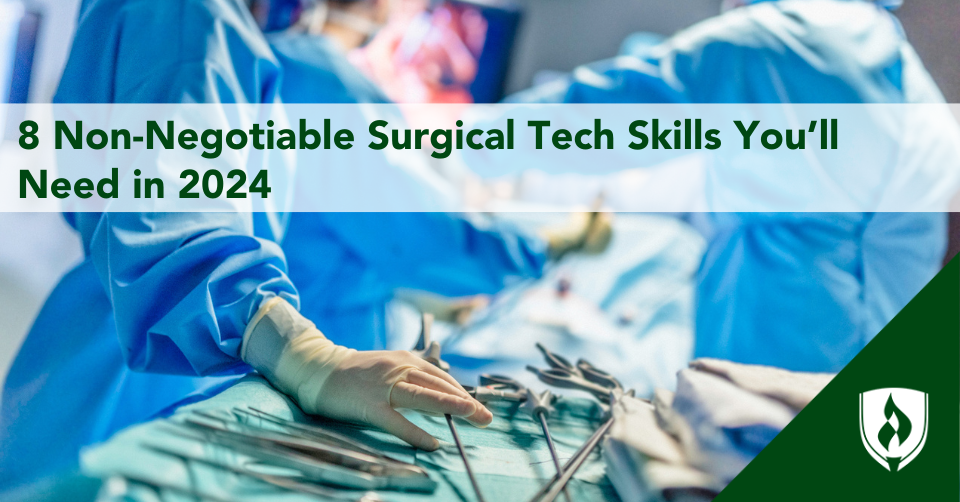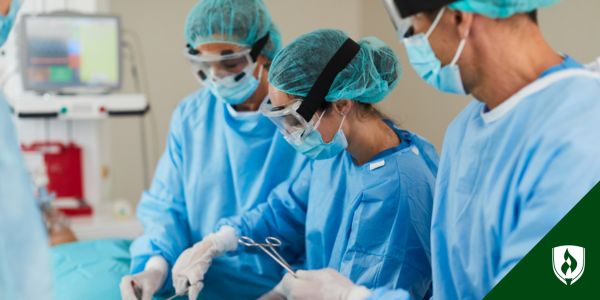
Sawing through bones. Holding live organs. It’s all “just another day at the office” when you’re a surgical technologist.
Few places in this world see turbulence like that which exists in an operating room. Every workplace has moments of madness, of course. But surgical procedures are, by nature, organized chaos.
Nonetheless, a surgical team is kind of like an organ system—each member must execute its unique duties so the others can work.
What are the duties of a surgical tech?
Just as the heart supplies blood to the brain, surgical techs provide surgeons with what they need for a successful surgery. Namely, that includes a sterile environment and sanitized instruments and equipment. Surgical techs are also tasked with preparing patients for the operating room.
In addition, they’ll routinely assist with surgical procedures. As a surgical technologist, you’ll keep retractors in place, disinfect incision sites and even hold internal organs while the surgeon works.1 Yes, hold. With your hands.
(If you’re still a bit unsure of what surgical techs do, check out Dissecting the Surgical Tech Job Description.)
Have you been looking into surgical technology, wondering… “Is this the right career path for me?”
If so, getting a closer look at what you need to thrive as a surg tech will help you decide. Read on to see what skills surgical technologists need, and try to envision yourself in this fascinating and tactile healthcare career.
8 skills and attributes that’ll set you up for success as a surgical tech
1. A strong stomach
Blood. Organs and bones. Weird smells.
The surgical environment is absolutely no place for the squeamish. You’ll see parts of the human body most people don’t even know exist—often, as they’re being handed to you.
It’s a gory job. But unlike many other kinds of healthcare “ick,” the type of thing you’ll see in the operating room is more the in-a-zombie-movie parts of the human body—less of the vomit, feces and urine side of things. (Though you may see some of that as well).
For many surgical techs, getting in the human body in this hands-on way is literally why they choose the career. If you were a fan of dissection in high school science, or if you find the deep, dark insides of us fascinating—you’ll probably love being a surgical technologist.
2. Equanimity in chaos
Can you stay cool, calm and collected—even when all signs point to trouble? As a certified surgical technologist, you’ll need to be able to answer, “yes.”
Let’s face it: the operating room is a high-stress environment. Patient lives are at stake. Introducing pathogens or breaking sterile field could kill someone when their body is open on the table.
On top of that, machines can malfunction, the human body can be unpredictable., and treatments might not go according to plan. A patient could have an adverse reaction to a medication or anesthetic.
In all of these situations, tensions between members of the surgical team (nurses, surgical assistants, surgeons, surgical technologists and more) can rise.
Surgical technologists handle multiple tasks during each operation. While maintaining sterile protocols and supporting their other team members, surgical techs are also ensuring patient safety in other ways. For instance, they’re counting sponges and instruments, labeling medications and, of course, doing anything else the surgeon requests throughout the procedure.
As a surgical technologist, your job is to push past all distractions and unexpected challenges.
Emergency situations can—and do—arise in ORs. You must be able to remain focused, practice effective communication and, above all, prioritize patient safety. Check out The Lingering Problem of Retained Surgical Items for some examples of what is at stake when surgical techs get distracted.
3. Incredible attention to detail
When you work as a surgical technologist, it’s up to you to anticipate which medical instruments and other supplies will be needed beforehand. Prior to each surgery, you’ll employ sterilization techniques to prepare all the equipment, tools and medications the surgical team will require.
Equally as important is maintaining the sterile field. This means being conscious of where your hands are, what you’re touching and the invisible boundaries of this space.
Attention to detail is non-negotiable for infection control.
4. Active listening
Let’s not underestimate the skill it takes to decipher what somebody’s saying—through a surgical mask—all while you’re surrounded by noisy machines!
“Listening to others [and] not interrupting” are both strengths that apply to a career as a surgical technologist, according to The National Board of Surgical Technology and Surgical Assisting®.1
When you’re at the operating table, you’ll need to “keep an ear out” at all times, ready to respond.
Surgical technologists must listen for updates on the patient’s status, surgical instruments being requested and other medical terminology regarding patient well-being.
5. Strong communication skills
Surg techs know when to speak up, what questions to ask and how to get a message across.2 When speaking with other medical staff, these skills could mean the difference between life and death.
“Surgical techs are there to advocate for patients,” says Jill Teodoro, Professor of Surgical Technology at Rasmussen University’s Romeoville/Joliet, Illinois Campus. “If something isn’t correct, we maintain sterile technique, and we have to speak up.”
Plus, this role is very team-oriented. Most of what you do will either be with or on behalf of someone else. Many surgical technologists share duties with the surgical assistant ( sometimes referred to as the surgical first assistant). Communication skills are essential to effectively coordinate and provide the best possible patient care.
6. Laser-sharp focus and concentration
Equipment alarms, anesthesia machines and hospital PA systems are just some of the distractions surgical technologists have to work around. Even surgical team members might divert your attention from important tasks.
Knowing what to concentrate on, and how to focus your attention is a skill that cannot be overlooked in the surgical field.
7. Stress management
People aren’t always nice, and polite social norms fall to the bottom of anyone’s priority list in life-or-death scenarios. This applies to surgical team members as well.
Surgical technologists need to know how to get their job done while coping with the stress of working with less-than-pleasant colleagues. A short-tempered surgeon, registered nurse or other team member doesn’t mean you can react or slip up in any way that could compromise patient care.
“As a surg tech, you have to have a strong backbone,” Teodoro says. If someone snaps at you or reacts in frustration, you need to be able to handle it.
8. Emotional Intelligence
Being able to work well with others isn’t just a strength in this field. It’s a necessity. Surgical team members must set aside any strong feelings that have the potential to detract from patient care. This is a key component of emotional intelligence (EI).
Self-awareness, self-regulation, empathy and effective social skills all contribute to a person’s EI. And, quality patient care hinges on certified surgical technologists’ EI, according to the Association of Surgical Technologists.2
Likewise, EI includes making a conscious effort to avoid acting on impulse. You must move carefully, with precision, in everything you do as a surgical tech. If you can’t control your emotions or your body language and remain professional, consider a less high-stakes role.
Developing skill in emotional intelligence will enhance effective problem-solving and communication, both of which are essential for teamwork and patient care in the operating room.3
Think you’ve got what it takes to succeed in surgical technology?
As you can see, surgical technology can be intense. It’s a very good role for people who thrive under pressure and who like working with their hands. Surgical technologists do so much more than pass instruments and equipment to surgeons.
They prepare tools and medications, practice aseptic technique and act as a “second set of hands” for the surgeon. They keep patients safe. And they have a watchful eye and a listening ear for every member of their team to keep things running smoothly.
If that sounds like a dream job, check out our article, “7 Signs You Should Consider Becoming a Surgical Technologist.”
National Board of Surgical Technology and Surgical Assisting® is a registered trademark of NATIONAL BOARD OF SURGICAL TECHNOLOGY AND SURGICAL ASSISTING
1Surgical Technologists, [accessed December 2023] https://jobs.nbstsa.org/career-insights/surgical-technologists/
2Emotional Intelligence of the Surgical Technologist [accessed December 2023] https://www.ast.org/ceonline/articles/431/431.pdf




